Content from the Brookings Doha Center is now archived. In September 2021, after 14 years of impactful partnership, Brookings and the Brookings Doha Center announced that they were ending their affiliation. The Brookings Doha Center is now the Middle East Council on Global Affairs, a separate public policy institution based in Qatar.
Events in Libya have taken a remarkable turn after the U.N.-backed government in Tripoli, the Government of National Accord (GNA), took back full control of the capital last Monday. The move forced Field Marshal Khalifa Haftar and his Libyan National Army (LNA) to abandon their year-long attempt to take the city and withdraw their forces from other towns and cities in the west of the country. Haftar’s own political survival has also come into serious doubt; there is increased discontent (including defections) within his fractious camp in the south and east, where Haftar’s forces still control swathes of territory.
Haftar’s military failures have disappointed his external backers: the United Arab Emirates, France, Russia, and Egypt. They enabled his military campaign to take control of Tripoli, providing him with significant military and political support, with the acquiescence of the United States. Half a year into the offensive, Russia intervened to help a struggling Haftar, sending in several hundreds of Wagner mercenaries to reinforce his push into Tripoli and increasing its military footprint in Libya. Yet, the conspicuous withdrawal of Russian mercenaries (including Wagner and Syrian, pro-Assad regime militias) from western Libya, which occurred after an alleged backdoor deal between Moscow and Ankara, has led to a route of Haftar’s forces from western Libya entirely.
Haftar’s backers are now re-assessing their position. This provides a timely opportunity for the U.S., which has so far been a bystander to the conflict, to deter Turkey and Russia from openly flouting the U.N. arms embargo on Libya and prevent Russia from moving closer toward establishing a permanent footprint in the east, Haftar’s stronghold. Washington can also ensure that Turkey’s military gains are leveraged to push through a viable and sustainable resolution to the conflict that does not result in continued strife.
The role of external actors
External actors are key to the Libyan conflict. The GNA’s victory in Tripoli has been undergirded by the support of Turkish air defense systems, fleets of drones, and mercenaries that Turkey withdrew from the Syria conflict. Turkey has provided military support since December 2019, when the GNA — the U.N.-recognized government in Tripoli — signed a controversial maritime agreement with Ankara. The latter saw in the GNA’s vulnerability a prime opportunity to advance its eastern Mediterranean interests. Although Haftar’s backers have called for a ceasefire, Turkey sees little reason to heed the calls. Haftar faces an increase in defections and diminished trust in his capabilities, and he may not politically survive the fallout from his military setbacks.
Ankara can potentially decisively shape the contours of the next phase of the conflict. Turkey and the GNA could continue their offensive, even intensify it further to capitalize on recent momentum. This would encourage further defections in Haftar’s camp, resulting in a potential implosion within his coalition. It would also ensure that, once a ceasefire does eventually materialize, the landscape will not have shifted in any fundamental political or military sense in favor of Haftar and his backers. For the GNA, the terms of a ceasefire would need to ensure that Haftar’s control of the east is not consolidated, forcing him to fade into irrelevance.
Turkey and the GNA should proceed with caution
By this token, Turkey’s strategy in Libya is working. However, Turkey should also tread carefully. Turkey’s new assertiveness could quickly turn into a miscalculation if Haftar’s backers double-down, giving up on their quest to control the country in its entirety and instead focusing on crystallizing autonomy in the east. Libya’s war is a proxy war, one where state sponsors may want to avoid escalation but could continue to provide their partners on the ground with enough resources to maintain the fight and prevent an outright defeat.
Haftar’s losses do not bode well for his relationship with his external backers. However, for those backers, the geopolitical reverberations of an outright victory for the GNA and Turkey would outweigh the costs of continued support for Haftar’s LNA. This could, at most, transform the east into a UAE and Russian protectorate; at minimum, continued support from external sponsors would strengthen Haftar’s negotiating hand if a ceasefire does at some point materialize.
The prospect of this kind of political maneuvering among the external actors is very real. In the Berlin Agreement, an accord co-sponsored by the U.N. in January 2020, outside powers ostensibly committed to halt their support to the warring parties. Afterward, Haftar’s backers accelerated their push to take Tripoli. Heavily influenced by France, Egypt, and the UAE, the agreement was designed to shape a political, economic, and security landscape favorable to Haftar. Now, a similar process that aims to prevent Turkey from advancing towards central and eastern Libya has been instigated by Egypt and Russia. Only days after Haftar’s offensive on Tripoli ended, Egypt’s President Abdel Fattah el-Sisi scrambled to host him and the head of the east’s House of Representatives, Agila Saleh, in Cairo to announce a unilateral ceasefire.
There, a humiliated Haftar seemingly appeared to submit to Saleh’s Russian-drafted political roadmap for Libya. The Cairo initiative is designed to undermine the U.N.-brokered 2015 Skhirat agreement, upon which the GNA’s international legitimacy is based, though it would also ultimately see Haftar phased out in favor of another figure. More importantly, it also signalled that Russia, Egypt, and the UAE will be jockeying to shape the political landscape over the coming months. Amidst the diplomatic maneuvers, Haftar’s backers are still militarily supporting his LNA in an effort to deter GNA-aligned forces and Turkey from advancing into eastern Libya.
Libya could become the next Syria
These attempts to freeze the conflict and establish a settlement that is premised on spheres of influence over eastern versus western Libya are short-sighted. Both Haftar’s LNA and the GNA coalition of forces are alliances of convenience. The former is a conglomerate of militias and individuals with disparate agendas that rallied under Haftar expecting to benefit from his foreign support and the prospect of him capturing Tripoli. The latter is a coalition of fractious militias and support forces that mobilized together in response to Haftar’s prospective takeover of Tripoli.
Freezing the conflict would fragment both coalitions, an outcome proxy powers cannot avert in the long run. Even a potential Turkish-Russian deal would, at best, lead to a de-facto partition of Libya. Conflict would diffuse locally, as coalitions fragment and militia groups contest power and resources at the local level. In addition, other proxy powers such as Egypt and the UAE could undermine an agreement between Russia and Turkey if they felt it marginalized their role.
The most dangerous risk for Libya is that it could quickly find itself facing expanded conflict. If international actors remain involved, Libya could resemble Syria’s landscape, with years of substantial arms influxes and a rapid proliferation of disparate external mercenaries. If international support for Libyan actors wanes or disappears, local grievances will take center stage, violently. While the ensuing fragmentation of these coalitions could manifest as local wars of attrition, further internationalization of the conflict would completely dismantle Libya’s social fabric and result in the displacement of hundreds of thousands and lead to countless deaths.
America’s role
Against this backdrop, Washington and Brussels should work jointly, prioritizing damage control by way of conflict management. The EU’s inability to enforce red lines is already clear, given France’s support for Haftar. Due to Paris’ long-standing support for Haftar, the EU may struggle to position itself as a credible and honest broker of peace. However, curbing Russian influence is already a priority for Europe, meaning Europe may want to avert a Turkish-Russian deal that would effectively partition Libya.
For its part, Washington could indirectly support the EU’s maritime Operation Irini, designed to oversee Libya’s arms embargo. Building on the commitments made during the Berlin accord, the U.S. Treasury could curb Russia’s influence by imposing sanctions on individuals, groups, and entities proven to be involved in the repeated transfer of weapons and mercenaries to Libya. This would prop up Irini’s maritime enforcement capacity, as its naval assets could specifically target vessels linked with sanctioned entities.
To deter foreign parties from moving to airlift weapons and mercenaries instead, the Pentagon could release satellite imagery of aerial embargo violations. That would build on the momentum established by United States Africa Command, which has highlighted Russian military aircraft deployed to eastern Libya and punctured Russian denials of its support for Haftar. Combined with sanctions, this constrains the space for outside actors to intervene in the conflict. Weakening Haftar and his allies would, in turn, reduce the need for the GNA to continue and expand its reliance on Turkey.
The involvement of nefarious outside actors is not the only threat facing Libya today; local conflicts are very real too. Nonetheless, reducing the influx of weapons and foreign fighters is an important piece of the Libyan puzzle, a tragic conflict that has already cost scores of lives.
The Brookings Institution is committed to quality, independence, and impact.
We are supported by a diverse array of funders. In line with our values and policies, each Brookings publication represents the sole views of its author(s).

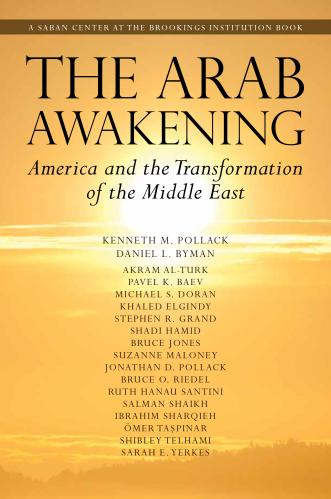
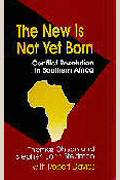
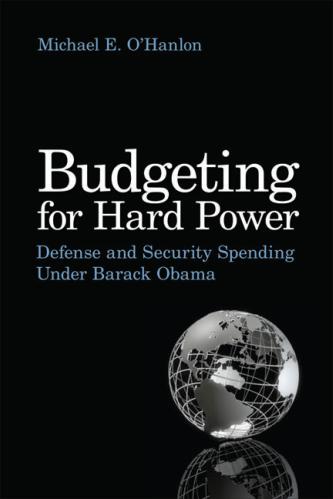
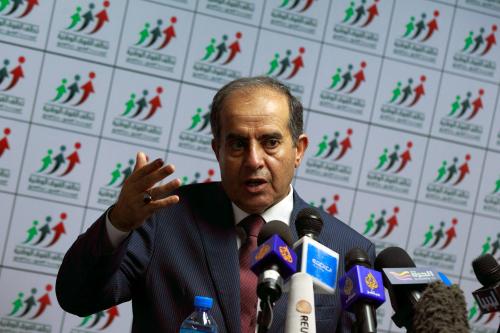
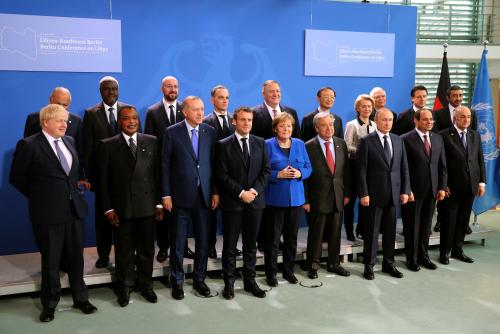

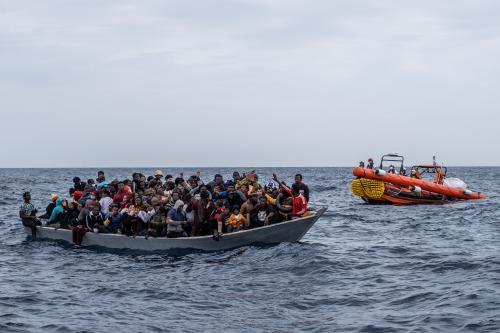
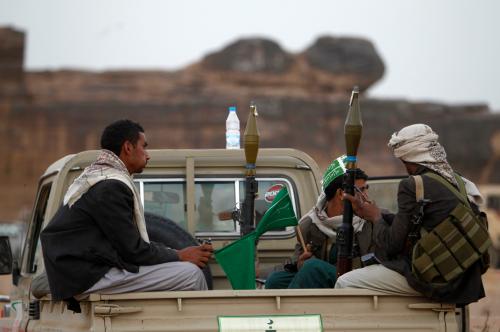
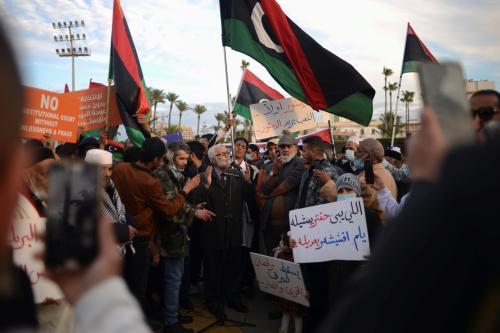
Commentary
Libya’s proxy sponsors face a dilemma
June 15, 2020